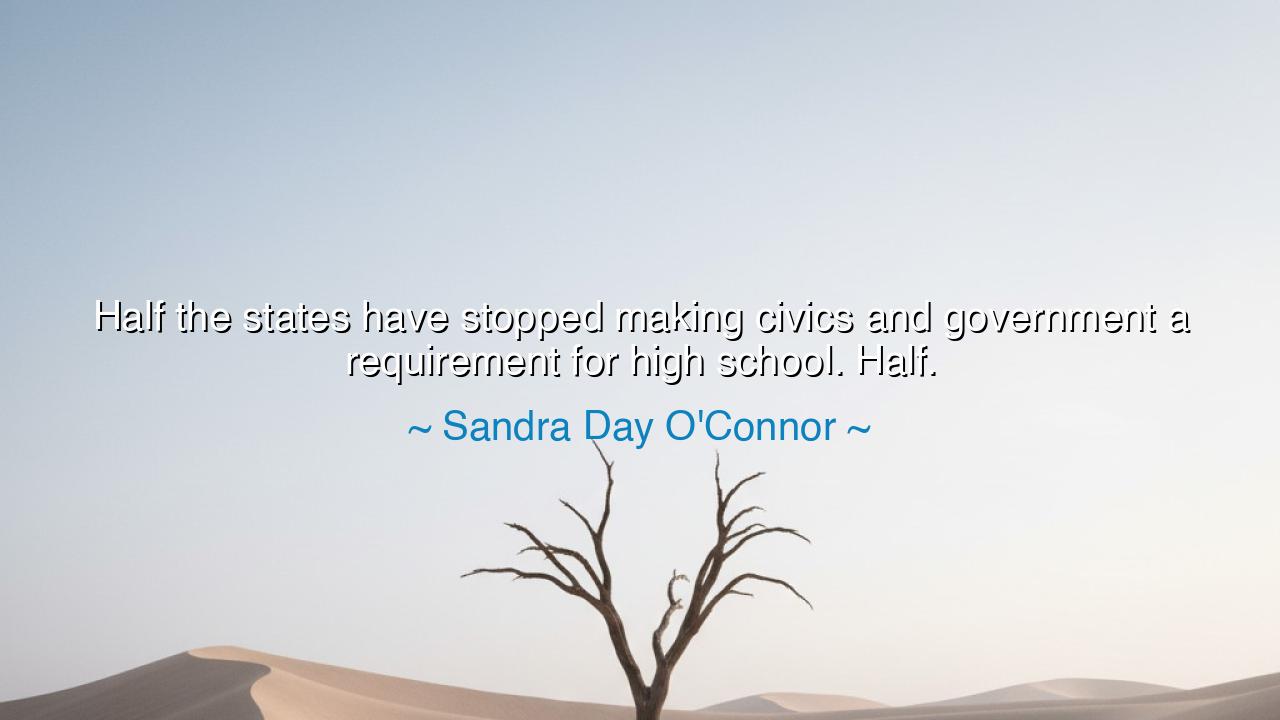
Half the states have stopped making civics and government a
Half the states have stopped making civics and government a requirement for high school. Half.






“Half the states have stopped making civics and government a requirement for high school. Half.” Thus lamented Sandra Day O’Connor, the first woman to sit upon the highest court of the United States, a guardian of justice who saw not only the cases of the present but the shadows of the future. Her words are not merely numbers—they are prophecy. They warn of a slow forgetting, a fading of the civic flame that once burned brightly in the hearts of citizens. For when a nation ceases to teach its young how freedom works, it begins, quietly, to lose that freedom altogether.
At the heart of O’Connor’s warning lies the ancient truth that ignorance is the enemy of liberty. A republic, unlike a kingdom, lives and dies by the knowledge of its people. Kings may rule without consent, but citizens must rule themselves—and how can they, if they do not know the laws, the rights, the duties, and the powers entrusted to them? When the teaching of civics and government is cast aside, the chain of understanding that binds one generation to the next begins to break. Freedom becomes a word without meaning, a relic admired but no longer lived. Thus O’Connor, who had seen the law’s grandeur and its fragility, sounded the alarm—not in anger, but in sorrow.
In her lifetime, she watched the tides of democracy rise and fall, and she knew that the health of the republic rests not in the courts or the capitol, but in the classrooms. It is there, in the minds of the young, that the idea of self-government must first take root. The ancient philosophers of Greece once said that a city’s fate depends upon the education of its youth. They taught that virtue and wisdom must be sown together, or both will perish. In like manner, O’Connor understood that the loss of civic education is not merely an educational failure—it is the slow unmaking of democracy itself. For without knowledge, the citizen becomes a spectator, and the government, left unguarded, grows distant and proud.
History offers us the proof of her warning. In the waning years of the Roman Republic, the people, once fierce defenders of their rights, grew ignorant of their constitution. They ceased to attend the assemblies, to question the Senate, to understand the laws that governed them. Bread and spectacle replaced participation and debate. In time, the republic’s freedoms withered—not by conquest, but by neglect. The people who no longer knew how to rule themselves were ruled instead. What began as apathy ended in empire. So too, O’Connor feared, could happen again, if the torch of civic understanding were allowed to dim.
But she did not speak to condemn—she spoke to awaken. With characteristic clarity, she founded iCivics, an endeavor to revive the teaching of citizenship through modern means. She understood that democracy must be taught anew to each generation, for it is not inherited by birth, but earned by participation. Her vision was that every student, before stepping into adulthood, should understand how to question authority, how to vote with wisdom, and how to hold leaders accountable. For in a republic, knowledge is the armor of the free, and ignorance is the opening through which tyranny creeps.
Her warning, then, is not a mere lament for education, but a cry for vigilance. The absence of civics is not just the silence of classrooms—it is the silence of citizens. It is the beginning of forgetfulness, when a people no longer remember what their government owes them or what they owe to it. The decay of civic understanding is the decay of the republic’s soul. For a nation that forgets to teach its children how to govern themselves prepares its children to be governed by others.
Therefore, O listener, let these words stir you to action. Do not leave the duty of understanding government to others—study, question, and teach. Speak to the young of their rights and their responsibilities. Tell them that liberty is not maintained by indifference, but by attention; not by comfort, but by care. Learn your history, your laws, your Constitution—for these are not dusty relics, but living chains that hold the nation together.
For the republic is a living flame, not a monument of stone. It must be fed by knowledge, guarded by vigilance, and passed on by teaching. So let the lesson of Sandra Day O’Connor be this: that when the schools fall silent on the matter of freedom, the people must speak louder still. Teach, learn, and remember—lest the light that once guided the world flicker, and go out.






AAdministratorAdministrator
Welcome, honored guests. Please leave a comment, we will respond soon